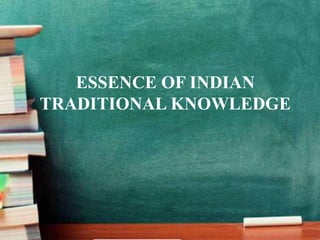
EITK UNIT-I PPT.pptx
- 1. ESSENCE OF INDIAN TRADITIONAL KNOWLEDGE
- 2. Definition Traditional knowledge is the knowledge system possessed by various communities across the global. Such knowledge has been accumulated over the years and has been used and passed down through several generations.
- 3. Nature and Characteristics of TK 1) it is transmitted from generations to generations 2) in many cases, it is transmitted orally for generations from person to person 3) it is being considered by the communities as gift of God and not as a private property 4) such knowledge typically distinguishes one community from another 5) it is usually impossible to identify the original creator of the information 6) it is learned through continuous observation, experience and practice 7)it is inseparable part of communal and cultural life of its holders,
- 4. Scope and Importance of TK •Influences Individual and community health •Reinforces sense of identity and group cohesiveness. •Contribute of present day practices •Represent generations of Knowledge and experiences
- 5. Types Of Traditional knowledge 1) Cultural 2) Artistic 3) Natural Resources 4) Agricultural 5) Sacred
- 6. Cultural Traditional Knowledge Regular Cultural Activities: • Doing Daily activates • Communicating with the people • Pray to god Occasional Cultural activities • Formalities in Marriages and other occasions • Wearing new clothes for festivals • Preparing special food in special days Ex: Ugadi pachadi, Chavathi payasam
- 7. Artistic Traditional knowledge •Singing •Dancing •Painting •Caste Occupation Ex: Barber, Palm toddy sellers, Carpenter work, Handloom work
- 8. Natural Resources TK • Water Harvesting • Protecting Environment • Planting Trees • Pollution free Activities Ex: Keep oxygen Generated plants at home Take heavy breath at morning time • Develop Organic Food • Maximum utilization of daylight
- 9. Agricultural TK • People have learnt how to grow food and preserve and to survive in difficult environments. • To know about the equipment what they used. Ex: Kodavali, Para, Goddali,Nagali • Clear Idea about Climate changes • Clear idea about soil • To know about Seasonal farming • Traditional Techniques to protect farm. Ex: scare crow ( Disti Bomma) , Electric fencing
- 10. Sacred TK For over 2500 years, many sacred symbols have held profound meaning for Indians. Even today, these shapes and graphic designs are used in the performance of daily rituals and worship
- 11. In Indian tradition every women pray to Tulasi everyday because they feel like it is a sacred activity.
- 12. The physical and social contexts in which traditional knowledge develop Physical Contexts: • Yoga & Meditation • Organic Food • Using natural medicines • Playing Traditional games • Old Recipes
- 14. Organic Food
- 17. Old Recipes
- 18. Social Context • Education System • Infrastructure Development • Life style • Relationship with the family • Technology
- 19. Education System
- 21. Life style • Behavior • Food • Thinking Ability • Appearance • Standard of life
- 22. Relationship with the family
- 23. Technology
- 24. Indigenous Knowledge • Characteristics of Indigenous Knowledge • Ecological Knowledge • Phonological Knowledge • Seasonal Knowledge • Indigenous Knowledge Vs Western Knowledge • Indigenous Knowledge Vs Formal knowledge